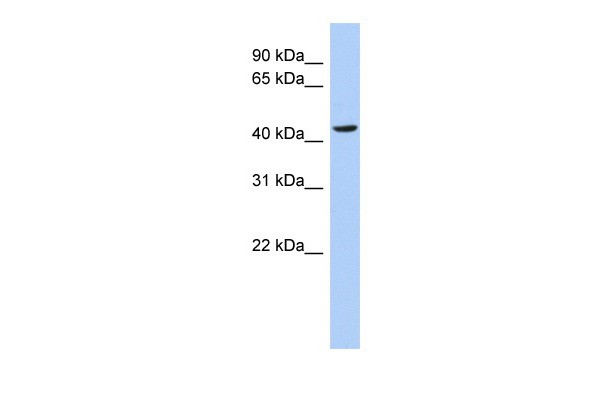MYC antibody - N-terminal region
| Product name: | MYC antibody - N-terminal region |
| Source: | Rabbit |
| Purity: | >95% |
| Buffer Formulation: | phosphate buffered saline , pH 7.4, 150mM NaCl, 0.02% sodium azide and 50% glycerol. |
| Applications: | WB |
| Storage: | Aliquot and store at -20°C. Avoid repeated freeze / thaw cycles |
| UOM: | 100ug |
Rabbit anti-MYC polyclonal antibody - N-terminal region
Catalog Number:IC105161
Product Profile
| ProductName | Rabbit anti-MYC polyclonal antibody - N-terminal region |
|---|---|
| AntibodyType | Tags Antibodies |
| Immunogen |
The immunogen for anti-MYC antibody: synthetic peptide directed towards the N terminal of human MYC |
Key Feature
| Clonality | Polyclonal |
|---|---|
| Isotype | IgG |
| Host Species | Rabbit |
| Tested Applications | |
| Species Reactivity | |
| Concentration | 1mg/ml |
| Purification | Affinity purified |
Target Information
| Gene Symbol | MYC |
|---|---|
| Gene Synonyms |
c-Myc
More
MRTL bHLHe39 |
| Gene Full Name | V-myc myelocytomatosis viral oncogene homolog (avian) |
| Gene Summary |
MYC is a multifunctional, nuclear phosphoprotein that plays a role in cell cycle progression, apoptosis and cellular transformation. It functions as a transcription factor that regulates transcription of specific target genes. Mutations, overexpression, rearrangement and translocation of this MYC gene have been associated with a variety of hematopoietic tumors, leukemias and lymphomas, including Burkitt lymphoma.The protein encoded by this gene is a multifunctional, nuclear phosphoprotein that plays a role in cell cycle progression, apoptosis and cellular transformation. It functions as a transcription factor that regulates transcription of specific target genes. Mutations, overexpression, rearrangement and translocation of this gene have been associated with a variety of hematopoietic tumors, leukemias and lymphomas, including Burkitt lymphoma. There is evidence to show that alternative translation initiations from an upstream, in-frame non-AUG (CUG) and a downstream AUG start site result in the production of two isoforms with distinct N-termini. The synthesis of non-AUG initiated protein is suppressed in Burkitt's lymphomas, suggesting its importance in the normal function of this gene. The protein encoded by this gene is a multifunctional, nuclear phosphoprotein that plays a role in cell cycle progression, apoptosis and cellular transformation. It functions as a transcription factor that regulates transcription of specific target genes. Mutations, overexpression, rearrangement and translocation of this gene have been associated with a variety of hematopoietic tumors, leukemias and lymphomas, including Burkitt lymphoma. There is evidence to show that alternative translation initiations from an upstream, in-frame non-AUG (CUG) and a downstream AUG start site result in the production of two isoforms with distinct N-termini. The synthesis of non-AUG initiated protein is suppressed in Burkitt's lymphomas, suggesting its importance in the normal function of this gene. Publication Note: This RefSeq record includes a subset of the publications that are available for this gene. Please see the Entrez Gene record to access additional publications.
More
|
| Alternative Names |
c-Myc
More
MRTL bHLHe39 |
| MolecularWeight(MW) | 50kDa |
| Sequence | 454 amino acids |
Database Links
| Entrez Gene | 4609 |
|---|---|
| SwissProt ID | P01106-2 |
| Protein Accession | NP_002458 |
Application
-

Western blot
0.2-1 ug/ml
ELISA Titer: 1:62500
Positive Control: HT1080 cell lysate
Additional Information
| Form | Liquid |
|---|---|
| Storage Instructions | Aliquot and store at -20°C. Avoid repeated freeze / thaw cycles |
| Storage Buffer | phosphate buffered saline , pH 7.4, 150mM NaCl, 0.02% sodium azide and 50% glycerol. |
Note: The product is for research use only,not for use in diagnostic or therapeutic procedures.













